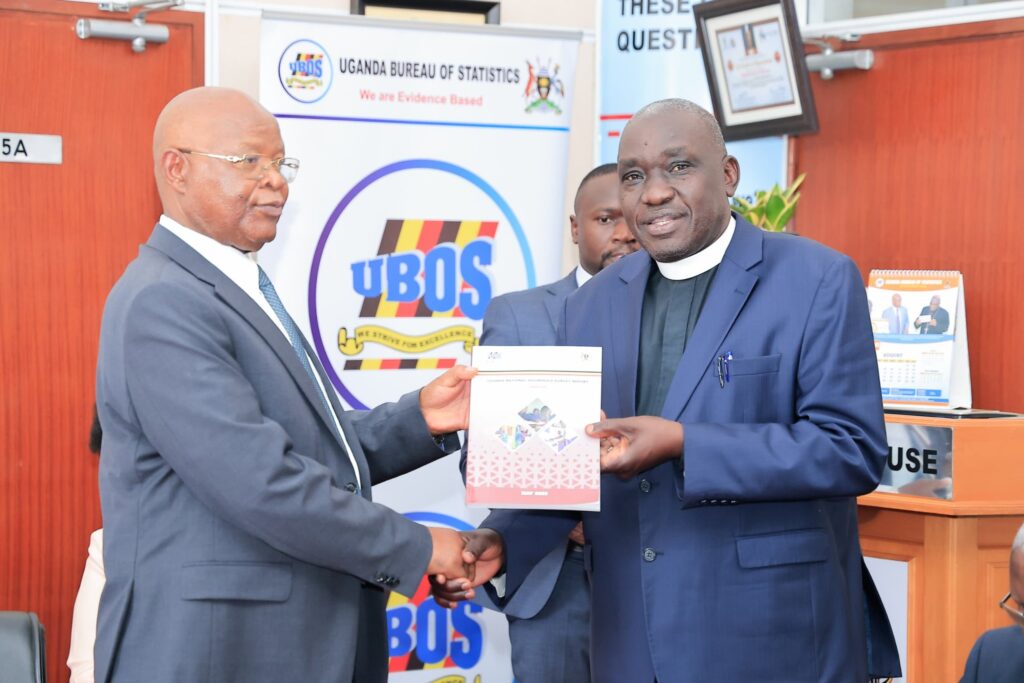The Executive Director of Uganda Bureau of Statistics Dr.Chris Mukiza has urged religious leaders to play a more active role in combating poverty by leveraging statistical data to guide their efforts.
Meeting leaders of the Inter-Religious Council of Uganda (IRCU), Mukiiza emphasized the importance of using official statistics in mobilization campaigns aimed at poverty eradication, promoting social accountability, and fighting corruption.
Founded in 2001, the Inter-Religious Council of Uganda (IRCU), is an indigenous, national faith-based organization uniting efforts of religious institutions to jointly address issues of common concern. IRCU is constituted by; the Roman Catholic Church (RCC), the Church of the Province of Uganda (Church Of Uganda-COU), the Uganda Orthodox Church (UOC), the Uganda Muslim Supreme Council (UMSC), the Seventh-day Adventist Uganda Union (SDAUU), the Born Again Faith in Uganda (BAF) and the National Alliance of Pentecostal and Evangelical Churches in Uganda (NAPECU).
According to the recently released Uganda National Household Survey 2023/24, more than 7.3 million Ugandans live below the absolute poverty line of $1 per person per day (Shs 3,663).
The survey reveals that 5.3 million of those living in absolute poverty are in rural areas, while 1.7 million reside in urban areas. The Karamoja sub-region recorded the highest number of people living in absolute poverty at 937,500, followed by Busoga (840,700), Buganda (767,900), West Nile (730,000), Bukedi (718,400), Teso (709,100), Lango (481,200), Bunyoro (454,900), Acholi (386,300), and Tooro (370,700).
“We are confident that you reach 90% of Uganda’s population. People trust you, and you play a key role in the development of this country,” Mukiza told the religious leaders.
Metropolitan Jeronymos Muzeeyi, the archbishop of the Orthodox Church of Uganda, stressed the need for an evidence-based, integrated approach to planning and service delivery.
“Planning for our people requires a robust, evidence-based approach, combining planning and service-oriented processes. We need an agenda rooted in data and proper accountability for the people we serve, the communities, and the Government of Uganda,” he said.
He announced IRCU’s intention to establish an Integrated Statistics Data Center, which will consolidate statistical data for planning, dissemination, protection, and use.
“The growing demand for comprehensive, accurate, reliable, and timely statistics amid an evolving data ecosystem necessitates such a center,” he added.
Metropolitan Muzeeyi reaffirmed IRCU’s commitment to results-oriented management, which relies on solid statistical information to define and measure development outcomes, identify key issues, advocate for change, and facilitate effective planning, implementation, monitoring, and impact assessment.
The proposed data unit will support IRCU members at all levels regional, district, parish, and village in collecting and using real-time, accurate, and reliable data. It will also offer insights into program and project outcomes, population characteristics, and socio- economic indicators within faith communities.
IRCU formally requested UBOS to provide: 5,000 data tablets; 136 network interfaces to enable real- time data access for stakeholders; Support in setting up a Data Center (infrastructure, tools, data management systems, and programming); Short-and long-term capacity-building training and a working Memorandum of Understanding to support joint planning, design, and implementation of evidence-based research and socio-economic studies
In response, Dr Mukiza pledged Ubos’ support in building IRCU’s capacity in data management and research, emphasizing that access to accurate information is crucial for effective community outreach and sustainable development.
He cited Ubos’ ongoing partnership with the Buganda kingdom as a model of community-based statistical collaboration.
The kingdom produces a statistical abstract titled “Manya Essaza Lyo” (“Know Your County”), which helps inform localized development planning. Dr Mukiza also committed to supporting IRCU in developing a strategic plan to enhance data use and operational efficiency.
He noted that if the council meets the required standards, it could be awarded a statistical quality mark and formally recognized as a trusted data source.

